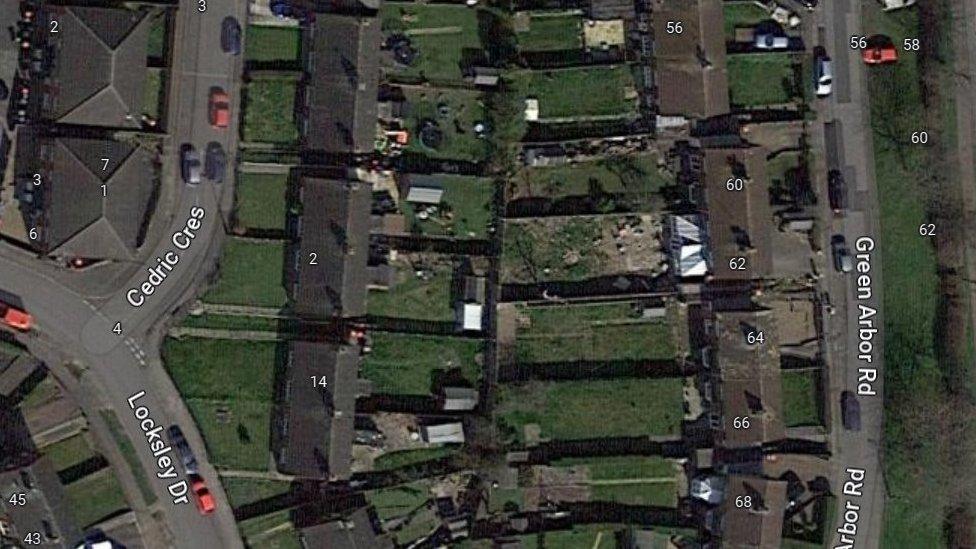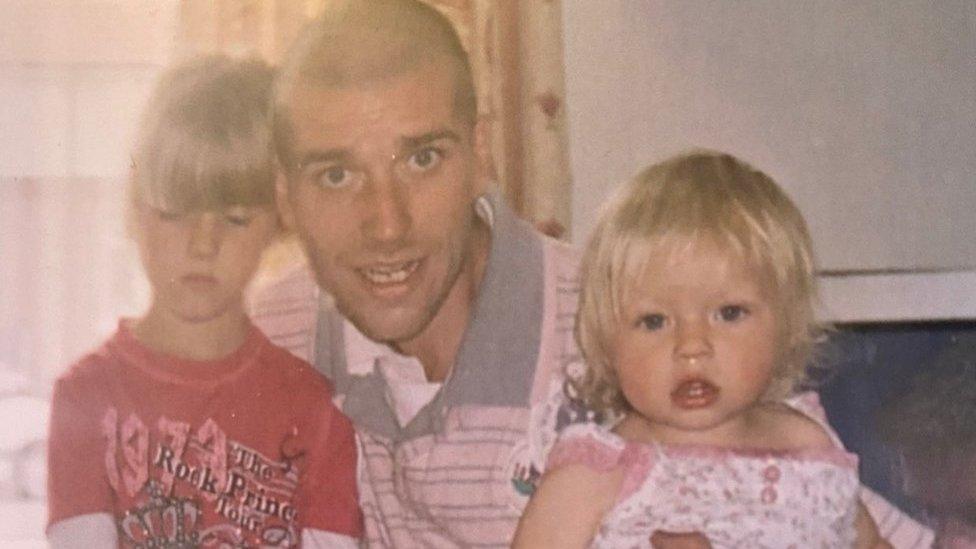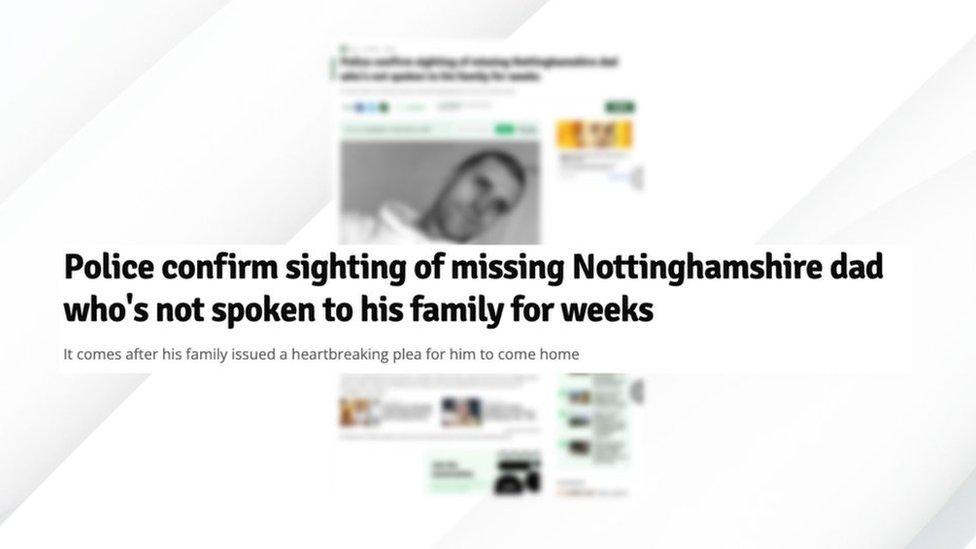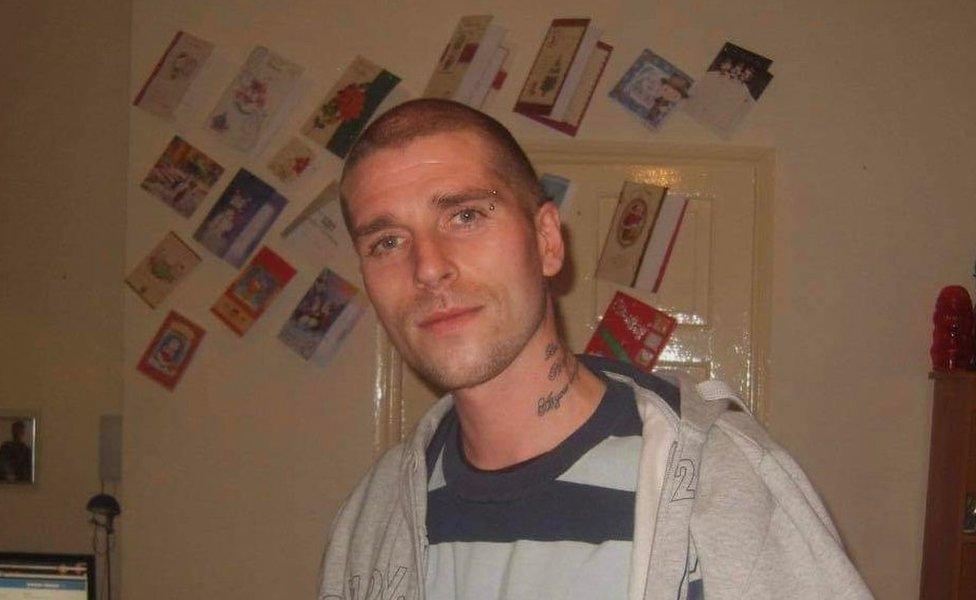Coroner's concerns over missing dad who died between fence panels
- Published
Corrina Bowman previously spoke to the BBC about how police responded to reports of her father being missing
A coroner concerned about how police dealt with a report of a missing man who was later found dead says she is worried more people could die.
Lee Bowman died after getting trapped between two fence panels, but his cause of death could not be determined because it took two months to find him.
The coroner who led his inquest has written to the College of Policing asking it to take action.
The College of Policing told the BBC it was considering the report.
Police's 'significant assumptions'
In the report, known as a Regulation 28 Report to Prevent Future Deaths, assistant coroner Abigail Combes said: "During the course of the inquest, the evidence revealed matters giving rise to concern.
"In my opinion there is a risk that future deaths could occur unless action is taken."
Her concerns included police making "significant assumptions" about Mr Bowman's whereabouts because of his alcohol addiction, and placing "insufficient weight" on what Mr Bowman's family told them.
Mr Bowman was from Ollerton in Nottinghamshire and was 44 when he died in 2021. He had two daughters, who are now aged 17 and 23.
He was last seen by his family on 29 October 2021, shortly before he went to visit his girlfriend, who lived in the village of Thurcroft in South Yorkshire.
His brother reported him missing on 2 November because Mr Bowman usually contacted his family several times a day and they had not heard from him.
However, Nottinghamshire Police treated it as a "deliberate absence" rather than a missing person inquiry.

Lee Bowman's body was found in a narrow gap between two fence panels at the end of the garden of 62 Green Arbour [sic] Road
Mr Bowman's father then reported him missing on 4 November, but the force wrongly believed he was still alive due to several false sightings, which the coroner said were "not necessarily thoroughly checked for accurateness".
The sightings included one by an off-duty police constable, and the coroner said there was "insufficient scrutiny applied to the veracity of that sighting".
The investigation was transferred to South Yorkshire Police on 28 November, but the force closed it down due to a false sighting by a PCSO.
The PCSO wrote in an email: "The missing person can be seen in Rotherham town centre on a daily basis. He is hanging around with the local drug users and drinkers."
South Yorkshire Police also falsely told a newspaper, external that Mr Bowman was "alive and well".
A spokesperson said at the time: "Inquiries established that the person in question is alive and well, however did not wish to engage further with our officers. After the individual was located, and it was established he was alive and well, our investigation was closed."

Mr Bowman had two daughters, who are now aged 17 and 23
The investigation was reopened by South Yorkshire Police on 7 December after Mr Bowman's family contacted police again to say they had still not heard from him.
The case was regraded as high risk on 14 December when it became apparent the sightings were unconfirmed, and detectives were then asked to lead the investigation.
Mr Bowman's body was found on 3 January 2022, close to where he had visited his girlfriend in Thurcroft two months before.
It was in a very narrow gap between two fence panels, which were at the end of gardens backing on to each other in Cedric Crescent and Green Arbour Road.
The pathologist who examined his remains could not determine his medical cause of death because of the decomposition.

In this article, published on 6 December 2021, police falsely stated Mr Bowman was "alive and well"
Among the concerns listed in her report, the coroner said: "The assumptions were based on the facts of Lee's addiction which on one view ought to have been identified as a vulnerability, on another view were wholly irrelevant in the context of his family confirming he was in daily contact until 31 October 2021.
"Insufficient weight was placed on the information provided by Lee's family about his current state of mind and ordinary behaviours."
Corrina Bowman, Mr Bowman's eldest daughter, said the coroner's concerns echoed what she had been saying ever since her father went missing.
'Gaslit' by police
She always felt police had not listened to her and her family, despite Mr Bowman's family having serious concerns.
"The coroner showed such professionalism and care when it came to the case of my dad," she said.
"My concerns about dad's whereabouts and the fact he had passed away were unfortunately correct, and to hear someone else confirm what I had believed and known made me feel comfort, as for nine weeks I was gaslit into thinking he was alive and well, when sadly he wasn't."

Mr Bowman was 44 when he died
The College of Policing, which is a professional body for everyone working across policing, now has a statutory duty to respond to the coroner's report by 4 January.
Its response must contain details of action taken or proposed to be taken, setting out a timetable for action.
Otherwise, it must explain why no action is proposed.
David Tucker, head of crime at the College of Policing, said he was considering the report and discussing the issues raised with Deputy Chief Constable Catherine Hankinson, who is the National Police Chiefs' Council's lead for missing persons.
"It would not be appropriate for us to comment further until we have submitted our response and the coroner has published it," he said.
South Yorkshire Police did not want to comment when contacted by the BBC.
'Learning identified'
Rob Griffin, Nottinghamshire Police Assistant Chief Constable, said: "This was an extremely tragic case and my thoughts remain with Lee's family at this incredibly difficult time.
"The coroner's report touches upon the response by both our force and South Yorkshire Police to Lee's disappearance.
"There are areas of learning identified within that report which have been addressed and already implemented across our teams which work incredibly hard to locate those who are reported missing."

Follow BBC East Midlands on Facebook, external, on X, external, or on Instagram, external. Send your story ideas to eastmidsnews@bbc.co.uk, external.
- Published11 November 2023

- Published2 May 2022
